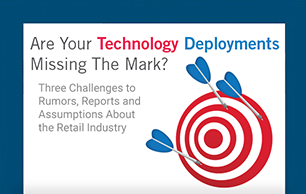 ShopTalk provided clear confirmation that AI is migrating from concept to conversation to reality. AI was highlighted in the vast majority of sessions and the show floor was filled with conversations and demonstrations involving AI technologies. Retailers are experimenting with AI to drive performance and to tackle some of their most pressing business challenges. Here are some of the use cases we heard about at ShopTalk.
ShopTalk provided clear confirmation that AI is migrating from concept to conversation to reality. AI was highlighted in the vast majority of sessions and the show floor was filled with conversations and demonstrations involving AI technologies. Retailers are experimenting with AI to drive performance and to tackle some of their most pressing business challenges. Here are some of the use cases we heard about at ShopTalk.
Improve the employee experience – Facing labor shortages and high turnover, retailers are scrambling to attract and retain employees. Yael Cosset, SVP & Chief Information Officer at Kroger, spoke about the ability for AI, in concert with automation technologies, to eliminate tedious, redundant tasks, expedite training, and simplify and personalize employee tasks. Rather than sitting for days in a classroom-style training course, new employees can train using virtual or augmented reality, which is much more interactive and can be personalized for specific challenge areas. In addition, AI can help provide information when employees are actually in the middle of customer interactions, reducing frustration.
Unified omnichannel experience – As it stands, some retailers excel at online order processing, while others offer a superior in-store experience. Some have nailed curbside pickup, whereas others specialize in frictionless in-store checkout. The vast majority of retailers have a strong suit and challenge areas. However, from the customer’s perspective, every brand experience needs to be consistent and seamless. Retailers are leveraging AI to build a consistent, unified omnichannel experience.
Reduce friction – George Hanson, SVP & Chief Digital Officer of Panera Bread said the fast casual chain is deploying palm-scanning automation technology to reduce friction throughout the entire order placement, order preparation and delivery process. Customization improves the customer experience by remembering the customer’s favorite orders, special instructions, food allergies and other details so that information is automatically incorporated at each visit, reducing errors and customer wait times.
Improve timeliness – When it comes to customer experience, timing is everything. In foodservice, foods may become cold if prepared too early or even risk food safety if left sitting for too long. This is both a quality and safety issue. In other retail environments, optimized order preparation may reduce customer wait times and/or free up limited storage space for prepared orders. AI is helping retailers in all categories improve the timeliness of order preparation based on predicted customer arrival times using AI technology.
Other applications discussed included use of AI for superior supply chain management, more effective merchandising and sustainability. There is no facet of the retail business that will not be enhanced or improved using AI. As retailers pursue improvements to deliver the best experience possible, the challenge is speed of planning and deployment. And that’s precisely where Telaid can help! We have extensive experience designing, deploying and supporting AI technologies in retail and foodservice environments. Contact us to learn more about our capabilities as you pursue strategic applications for AI.




